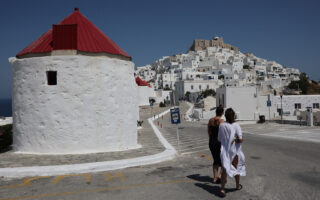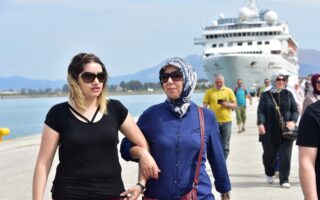May is the new July in Athens and on the islands

The tour buses for the Acropolis are paralyzing traffic on Amalias Avenue. The crowd of tourists on Dionysiou Areopagitou Street is reminiscent of July. Trash overflows from the bins in the middle of the day. The sidewalks are occupied by tables and chairs. The restaurants are unbearably expensive, and at the open-air cinemas, you have to book a seat because they are among the most popular attractions in the city.
Airbnbs are gentrifying entire neighborhoods, driving out regular tenants. Rents in the center and around it are becoming a social wound. Athens belongs more and more to visitors rather than its residents. On the beaches along the southern coast on weekends, shade costs as much as champagne: 30-90 euros for an umbrella.
Swimming in the sea, even in May, is therefore a luxury for Athenians. The same goes for a short trip to the Cyclades. It’s hard to find a double room next week for less than 120 euros a day on a not particularly sought-after island. Even if Athenians could take time off in early June, the cost for an average salaried worker is unbearable. At the same time, the infrastructure on the islands is strained, water shortages are a problem even before summer starts, waste management is a challenge for local authorities, and the natural environment is deteriorating.
On the beaches along the southern coast on weekends, shade costs as much as champagne
Can islands like Santorini, Mykonos or Paros be saved, or is the situation irreversible? Will the next island we call the “new Antiparos,” the “new Sifnos,” or the “new Kimolos” be destroyed? In the future, will we see any “xerolithies” (dry stone walls) and roosters, or will they exist only as Instagrammable accessories? Will any fisherman be fishing, or will nets only serve as picturesque backdrops for selfies? Will anyone find Greek tomatoes in tavernas in the summer, or will they cost more than quinoa?
The locals, even those who are greedy, feel that this cannot continue, and those with property see their assets devalued. Already, some islands are being discredited internationally as overpriced, dirty, overcrowded examples to be avoided. And so everyone loses.
The issue with overtourism is precisely that it affects everyone: the poor and rich residents of Athens and the islands, environmental activists, hoteliers, hotel workers, tourists – everyone.





